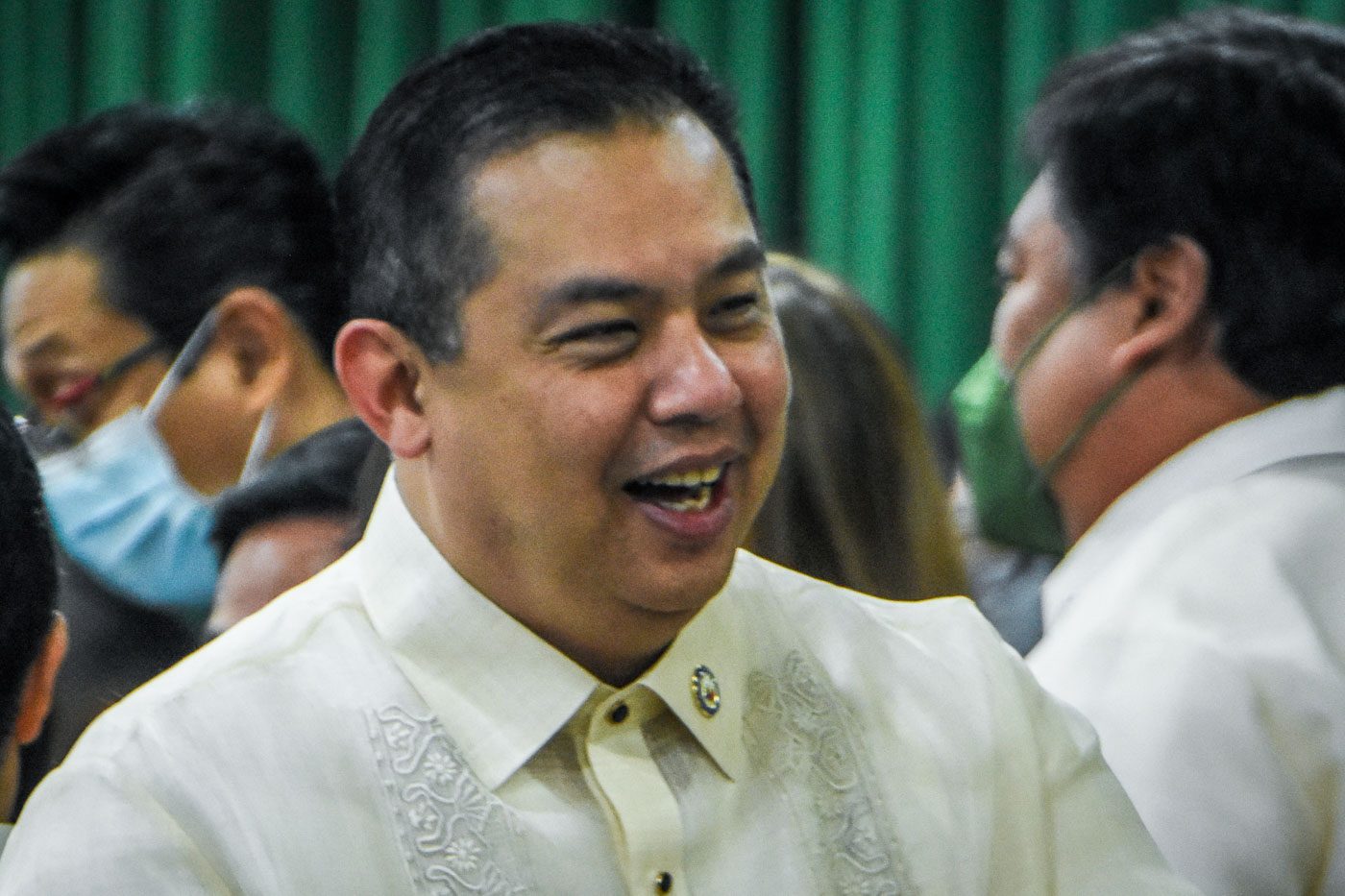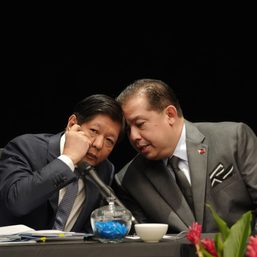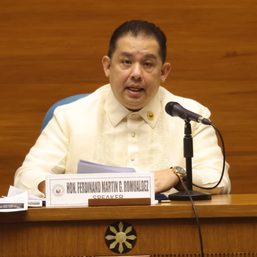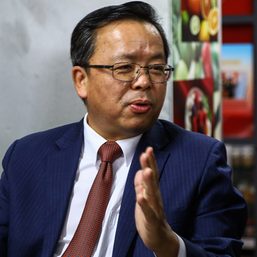SUMMARY
This is AI generated summarization, which may have errors. For context, always refer to the full article.

MANILA, Philippines – Speaker Ferdinand Martin Romualdez and several other lawmakers, including presidential son Senior Deputy Majority Leader Sandro Marcos, have filed a bill seeking to create a Philippine sovereign wealth fund – the “Maharlika Investments Fund (MIF).”
Under House Bill 6398, the proposed fund would draw money from government pension funds and banks to invest in real and financial assets, and will be managed by the Maharlika Investments Corporation (MIC), a government-owned and -controlled corporation to be created through the measure.
The aim of the proposed fund is to promote economic development, strengthen the national budget, and boost citizen savings. The bill draws inspiration from the nearly 50 countries around the world with sovereign wealth funds, such as Singapore, China, Hong Kong, South Korea, Indonesia, and Taiwan.
The MIC would be allowed to invest in cash, foreign currencies, tradable commodities, fixed income instruments such as government and corporate bonds, listed and unlisted equities such as stocks, financial derivatives, joint ventures, mutual funds, and commercial real estate and infrastructure.
The proponents of the bill have stated that the fund would follow the Santiago Principles, a list of international best practices for sovereign funds, “to ensure transparency and accountability.”
Salary, tax exemptions of fund
The bill seeks to exempt the government financial institutions that contribute to the proposed fund from Republic Act No. 10149 or the GOCC Governance Act Of 2011. RA 10149 provides governance standards for GOCCs such as salary grades, disclosure requirements, and special audits.
Officers and employees of the sovereign fund would also be exempted from Republic Act No. 6758 or the Salary Standardization Act, as well as succeeding laws on salary standardization. Instead, the Maharlika Investments Corporation would have the power to set its own compensation guidelines.
“[T]he compensation of the officers and key personnel of the MIC shall be set based on an objective classification consistent with international standards for compensating investment management professionals managing global assets,” the bill’s authors said in their explanatory note.
Internationally, top fund managers routinely take home multimillion-dollar compensation packages.
Albay 2nd District Representative Joey Salceda said that the fund should still be subject to congressional oversight.
“While exempt from GOCC governance, the MIF is still a public fund. As such, periodic review and oversight by Congress should be in place,” he said in a meeting of the House committee on banks and financial intermediaries on Tuesday, November 29.
The bill also proposed for the sovereign fund and its managing company to be exempted from all kinds of taxes, including value added taxes and documentary stamp taxes.
The proposed bill provides that “no tax measure of whatever nature enacted shall apply to the MIF and MIC, unless it expressly and categorically revokes the declared policy of the State in this Act and this Section granting tax exemption to the MIF and MIC.”
Regarding the tax exemptions, Salceda agreed with them, but raised concerns on how they might be exploited.
“We will allow all the exemptions that were listed for as long as they inure to the MIC and the MIF. Isa lang ang problema. E paano kung ‘yung presidente bumili ng 10 kotse? E di hindi siya magbabayad ng excise tax sa 10 kotse.”
(There’s one problem there. What if the president buys 10 cars? Then he wouldn’t have to pay excise tax on the 10 cars.)
The bill would also vest the leadership of the MIF to a single individual who holds the position of both chairperson and chief executive officer, for a term of seven years.
Here, Salceda raised a possible conflict of interest: “The purpose of the board is to [oversee] the executive officer such as the CEO. The board also typically decides matters such as hiring and executive remuneration of the officers. Co-mingling CEO and chair position in a government fund could be prejudicial to accountable governance of the fund,” he said.
He added that the board should have the ability to fire the chief executive officer, which would not be possible if the chairperson and CEO were one and the same.
In their explanatory note, the bill’s authors noted that sovereign wealth funds “can also successfully be used as a tool of national strategy,” citing Singapore’s GIC Private Limited; and as a direct investment magnet, citing the experience of the Indonesia Investment Authority.
Sovereign wealth funds, however, can also be exploited, as shown by the 1Malaysia Development Berhad (1MDB) scandal in Malaysia. Former prime minister Najib Razak is serving a 12-year prison term for corruption.
Funding sources
In starting up the fund, the bill seeks initial investments totaling P250 billion from four government financial institutions:
- P125 billion from the Government Service Insurance System (GSIS)
- P50 billion from the Social Security System (SSS)
- P50 billion from the Land Bank of the Philippines (LANDBANK)
- P25 billion from the Development Bank of the Philippines (DBP)
The national government is also obliged to place an initial investment of P25 billion. The bill also seeks the following annual contributions:
- The foreign currency equivalent of 10% of overseas Filipino workers’ remittances, to be given by the Bangko Sentral ng Pilipinas (BSP)
- 10% of the annual contribution of the business process outsourcing sector, to be given by the BSP
- 10% of the gaming proceeds from the Philippine Amusement and Gaming corporation (PAGCOR)
Regarding the proposed annual contributions, Sittie Butocan BSP director of the Department of Economic Research, pointed out that the BSP does not actually receive funds from overseas remittances and BPO activities.
“We are unsure of the basis of this provision…mainly because the BSP does not earn nor hold funds coming directly from overseas Filipino remittances as well as BPO revenues,” she said.
The other authors of the bill are House Majority Leader Manuel Dalipe, Tingog representatives Yedda Romualdez and Jude Acidre, and Marikina City Representative Stella Quimbo.
The house banks panel has approved in principle House Bill 6398 during the November 29 meeting. A technical working group will be formed by the committee to accommodate amendments discussed.
The term “Maharlika” has been associated with the late dictator Ferdinand Marcos, the uncle of the Speaker and grandfather of congressman Marcos. Maharlika is the name of the fabricated World War 2 guerilla unit that Marcos had claimed to lead. The late dictator had also once proposed to rename the Philippines “Maharlika.”– Rappler.com
1 comment
How does this make you feel?

![[In This Economy] Why Marcos is getting high on unprogrammed funds](https://www.rappler.com/tachyon/2024/07/TL-marcos-program-funds-july-19-2024.jpg?resize=257%2C257&crop=265px%2C0px%2C720px%2C720px)
![[In This Economy] Is the Marcos government unlawfully dipping into PhilHealth funds?](https://www.rappler.com/tachyon/2024/07/marcos-government-philhealth-funds-july-12-2024.jpg?resize=257%2C257&crop=425px%2C0px%2C1080px%2C1080px)













![[Ask The Tax Whiz] Output VAT credit on uncollected receivables: What taxpayers must know](https://www.rappler.com/tachyon/2022/11/tax-papers-hand-shutterstock.jpg?resize=257%2C257&crop_strategy=attention)
![[Ask The Tax Whiz] What’s new on invoicing requirements under the Ease of Paying Taxes law?](https://www.rappler.com/tachyon/2024/06/tax-whiz-receipts.jpg?resize=257%2C257&crop=459px%2C0px%2C720px%2C720px)

![[Ask the Tax Whiz] Withholding tax under Ease of Paying Taxes law](https://www.rappler.com/tachyon/2022/11/tax-papers-shutterstock.jpg?resize=257%2C257&crop=205px%2C0px%2C900px%2C900px)
This sounds suspiciously like 1MDB fund scandal.